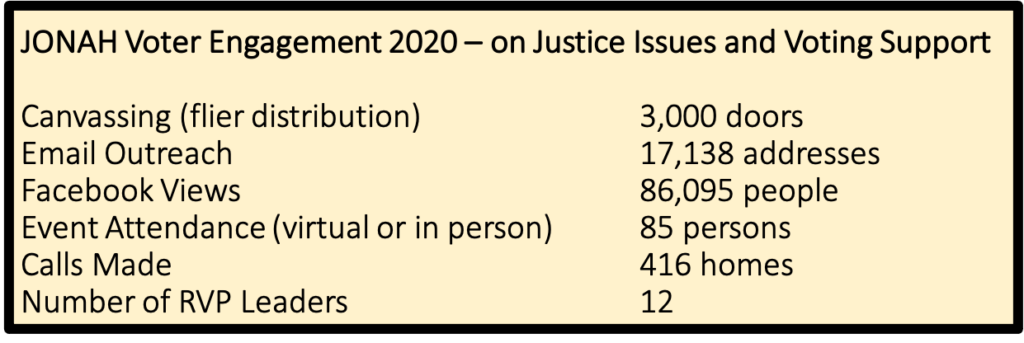By Sara Larsen – Volunteer
JONAH provided multiple opportunities for individuals (with the option to be paid) in the community to get involved in building relationships through sharing education on our issues and offering support to potential voters. It is these relationships that help shift our community narrative and can encourage people to vote the issues! Sara Larsen shares below her experience with making calls for the first time.
Before Volunteering
I wanted to get more actively involved in the election through additional ways outside of my day-to-day job but didn’t know where to start. I also wanted an option that I could pursue when it fit best into my schedule instead of the other “traditional” volunteer options out there with set dates and times. Then I saw the JONAH ad in Volume One and decided to send a quick email to find out more about this opportunity. Prior to seeing that ad, I had recently started to hear more about JONAH through various projects at work and this experience gave me a reason to learn more about the organization.
During Volunteering
The older I get the less I seem to worry about what people think of me or how they might react at any given time. That doesn’t change the fact that I still got butterflies when dialing my first few phone numbers. I tried not to psych myself out and continually reminded myself that several people probably wouldn’t even answer, just as I hadn’t during the endless amount of calls I got during the election. However, with every call dialed and every voicemail left, it got easier and easier. The part you can never quite be fully prepared for is when someone does actually answer. You find yourself scrambling to sound as official and caring as possible all while promising to have a quick meaningful conversation with the stranger who was willing to pick up on the other end of line.
For the few souls that did answer, they were generally kind and receptive to talking. What I found interesting are some of the questions I was asking such as, “Do you know where your garbage ends up after it’s been picked up?”, had me reflecting that I didn’t know what my answers would be to some of these questions.
Reflecting After
The experience of checking in with my family and friends to see if they had a plan for voting felt good. It helped start meaningful conversations with people I care for and did ultimately make me feel that I was making some sort of impact compared to before I started volunteering with JONAH.
Cold calling people about issues in our area taught me a few things. First, it reminded me to keep up the practice of being kind when talking to a stranger on the phone regardless of why they may be calling. You never know what kind of day they’re having or their intentions until you find out for yourself. Second, it brought to the forefront that I don’t know as much about policies and processes at the local, regional, and state levels that may impact me. Finally, connecting with strangers who share the same air, water, resources, and more with me and my loved ones was a good reminder that we’re all interconnected whether we remember it or not.

Note: An RVP leader is a person who participates in the Relational Voter Program and committed to talk to at least 20 people in their circles about voting and see if they needed support.
